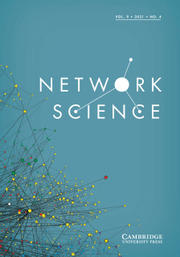Article contents
Centralities for networks with consumable resources
Published online by Cambridge University Press: 13 September 2019
Abstract
Identification of influential nodes is an important step in understanding and controlling the dynamics of information, traffic, and spreading processes in networks. As a result, a number of centrality measures have been proposed and used across different application domains. At the heart of many of these measures lies an assumption describing the manner in which traffic (of information, social actors, particles, etc.) flows through the network. For example, some measures only count shortest paths while others consider random walks. This paper considers a spreading process in which a resource necessary for transit is partially consumed along the way while being refilled at special nodes on the network. Examples include fuel consumption of vehicles together with refueling stations, information loss during dissemination with error-correcting nodes, and consumption of ammunition of military troops while moving. We propose generalizations of the well-known measures of betweenness, random-walk betweenness, and Katz centralities to take such a spreading process with consumable resources into account. In order to validate the results, experiments on real-world networks are carried out by developing simulations based on well-known models such as Susceptible-Infected-Recovered and congestion with respect to particle hopping from vehicular flow theory. The simulation-based models are shown to be highly correlated with the proposed centrality measures.
Reproducibility: Our code and experiments are available at https://github.com/hmwesigwa/soc_centrality
Keywords
- Type
- Original Article
- Information
- Copyright
- © Cambridge University Press 2019
References
- 4
- Cited by


